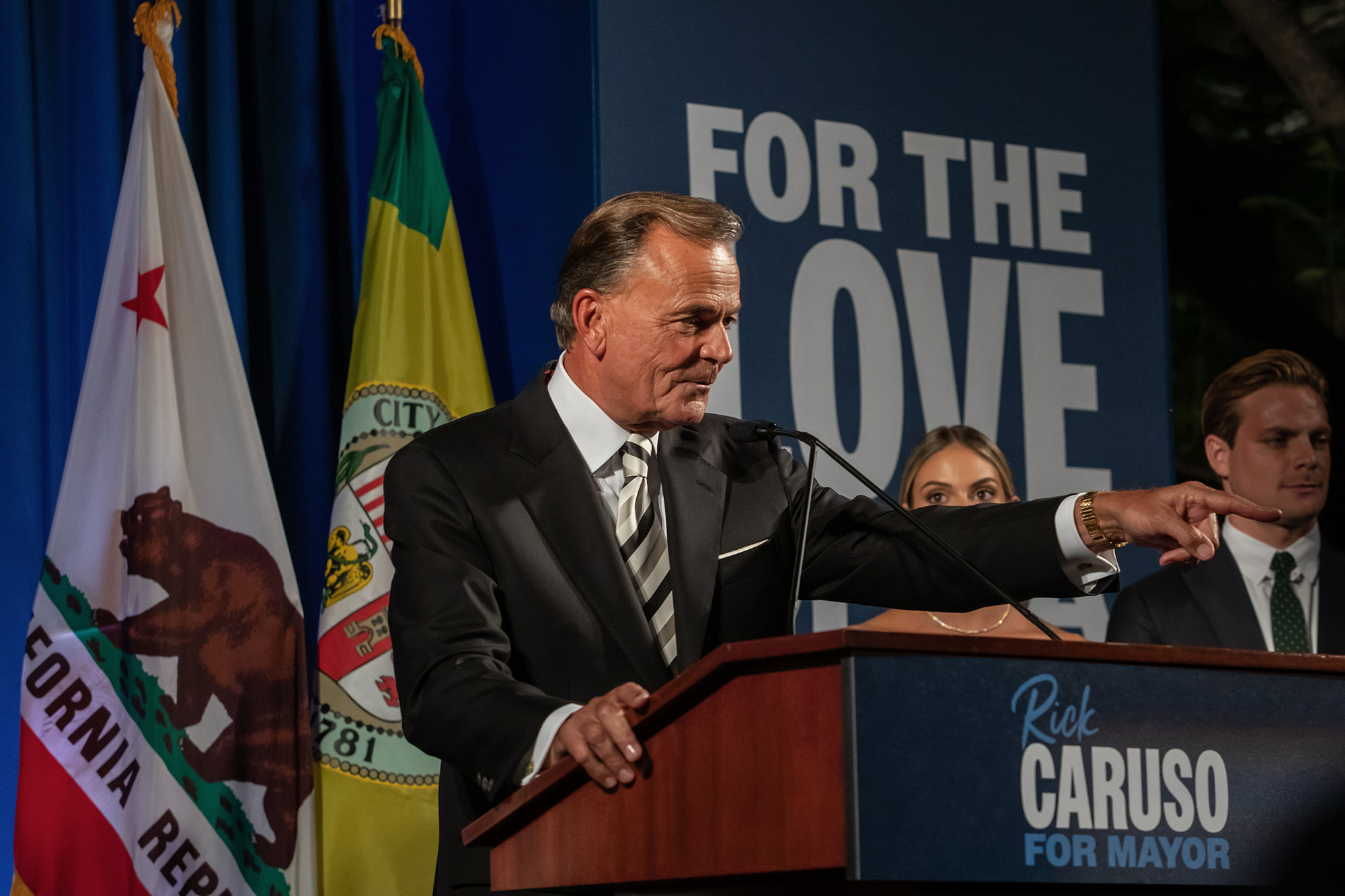Latest News
Rick Caruso Promises to End Pay to Play Politics But Is Silent About His Own Big Political Donations
Political giving by the Los Angeles mayoral candidate tops $1 million since 2020.

Los Angeles mayoral hopeful and billionaire developer Rick Caruso vows that if elected, he’ll clean up corruption and increase transparency at City Hall.
“We need tougher laws around transparency and reporting that reform the way development is approved in Los Angeles,” Caruso says on his campaign website.
Join our email list to get the stories that mainstream news is overlooking.
Sign up for Capital & Main’s newsletter.
The developer gave $500,000 to California’s COVID relief efforts at the behest of Gov. Gavin Newsom in 2020. Caruso’s donation is listed as a “payment to influence” the governor on four bills aimed at protecting COVID-affected tenants from eviction in 2020, but he has not said whether he supported or opposed the bills, and did not respond to interview requests. At the Sept. 21 mayoral debate, however, Caruso said that he believes tenants should be allowed to defer rent payments only if they can document that they are affected by the pandemic.
Eviction protections are of immediate interest to Los Angeles renters, who make up 63% of the city’s residents. The City Council is currently debating how to wind down the city’s pandemic-spurred eviction safeguards and what tenant protections, if any, to put in their place. But Caruso, who owns or is developing 482 luxury apartment units — 240 of them in the city of Los Angeles, 14 of which will be offered at below-market rents — hasn’t said what he hoped to achieve with his lobbying in Sacramento in 2020.
Before Rick Caruso opposed pay to play, he defended the system he now calls corrupt.
Caruso also donated $750,000 to the California Business Roundtable in 2020. The organization poured millions of dollars into campaigns to defeat two ballot propositions in that year, Prop. 21, which would have allowed stricter rent control laws, and Prop. 15, which would have levied higher taxes on most commercial properties, eliminating their Prop. 13 tax benefits and directing the increased revenues to schools and community colleges.
The Caruso campaign did not answer repeated calls, and failed to respond to emailed questions about what causes he sought to support with his donations. Nor did Caruso answer questions about where he stood on eviction protections at the time he made his $500,000 payment to the state’s COVID relief measures. The mall magnate also remained silent on how he changed his mind about the role of political money at L.A. City Hall.
Before Caruso opposed pay to play, he defended the system he now calls corrupt.
In 2016, he told the Los Angeles Times that the city of L.A.’s planning process was “very open and democratic.” At the time Caruso made that statement, former City Councilmember José Huizar, who was arrested on federal bribery and racketeering charges in 2020, chaired the powerful City Council Planning and Land Use Management Committee and, according to federal prosecutors, used his office and the committee for his own personal financial gain.
Now, Caruso proposes a list of ethics reforms, including taking away the City Council’s ability to make land use decisions, so that developers can’t buy influence with money or gifts. Caruso has accused his opponent, Karen Bass, of wrongdoing in accepting a USC scholarship; she denies she did favors for the university in return or received special treatment.
Both Caruso and Bass have said they’d appoint an “ethics czar.” But in the Sept. 21 mayoral debate, Bass went a step further, naming former President Barack Obama’s unofficial ethics chief Norm Eisen, whom she said would conduct a “top to bottom” ethics review at City Hall. Eisen, now a senior fellow at the Brookings Institution, could not be reached to confirm that he’d agreed to conduct an L.A. City Hall ethics check.
L.A.’s next mayor will preside over a City Hall in which three former city councilmembers have faced bribery-related charges.
Because of Huizar’s upcoming trial — currently set for February 2023 — the issue of ethics reform could gain greater attention, said Bob Stern, a government ethics expert who wrote California’s Political Reform Act in 1974.
After all, L.A.’s next mayor will preside over a City Hall in which three former city councilmembers, including Huizar, have faced bribery-related charges. City Councilmember Mitch Englander pleaded guilty to obstructing a public corruption investigation in 2020 and was released from federal prison last February. City Councilmember Mark Ridley Thomas was indicted last October for accepting benefits from USC in exchange for supporting county contracts for the university when he served on the Los Angeles County Board of Supervisors.
Stern credits Caruso for raising the issues, but Sean McMorris, who is transparency, ethics and accountability program manager for California Common Cause, calls Caruso’s proposals “typical political talking points.”
If elected, Caruso has promised to demand transparency of city councilmembers and also publicly disclose his own official schedule. Currently, Mayor Eric Garcetti discloses all public events to which the press is invited.
But his campaign has not responded to Capital & Main’s repeated phone calls and emails about why he leapt into the legislative debate on COVID eviction protections. On that issue, Caruso hired a lobbyist in Sacramento for only the second time in 15 years.
Caruso paid the Sacramento powerhouse law and lobbying firm of Nielsen Merksamer Parrinello Gross & Leoni $20,000 to weigh in on four bills aimed at averting mass evictions at the height of the COVID-19 lockdown, according to state disclosure forms. The firm has a track record of representing landlords and realtors against tenants — most recently in two separate lawsuits challenging Bay Area eviction protections. Its lawyers also served as campaign treasurers for a committee opposed to Prop. 21, a 2020 initiative that would have allowed stricter rent control in California.
The disclosures also show that Caruso’s $500,000 behested payment was made to further his lobbying activities on the 2020 eviction protection bills. So-called behested payments offer a way for deep pocketed individuals and corporations to curry favor with elected officials by giving unlimited amounts to officeholders’ favorite causes. A spokesman for the California secretary of state said such disclosures are required “if the primary purpose of the payment was to support lobbying activities.” Caruso’s $500,000 went to the Sierra Health Foundation for California’s COVID response fund at the behest of Gov. Newsom.
Caruso has lavished donations on elected officials with the power to approve his luxury residential and retail projects.
Caruso made his “payment to influence” Newsom on Aug. 4, 2020, when business groups led by the California Apartment Association were lobbying hard against what the CAA called “a free-rent bill” — legislation by then-Assembly Housing Committee Chairman David Chiu (D-San Francisco) that was aimed at preventing evictions of COVID-affected renters.
A few weeks later, the CAA reported to its members in an online bulletin that it had negotiated with the governor and legislative leaders to come up with what it called a “less burdensome alternative” bill, which the governor signed.
Locally, Caruso has lavished donations on elected officials with the power to approve his luxury residential and retail projects. Some of his larger donations came in 2016, just before the City Council voted to approve a zone change, a waiver of height restrictions and other concessions he’d requested for his luxury retail and residential tower currently planned near the Beverly Center at 333 La Cienega. Caruso gave $200,000 to a local ballot measure committee backed by Mayor Eric Garcetti and $100,000 to Los Angeles Forward, set up by Councilman Mike Bonin. An FAQ page on the development’s website noted “any suggestion that our financial support of elected officials somehow sways the process is preposterous.”
Now Caruso argues that to eliminate pay to play there should be a clearly defined zoning code that doesn’t allow such exceptions.
But Sean McMorris of California Common Cause said the candidate’s proposal is unrealistic, citing the very few major projects that don’t propose variations from zoning rules.
Caruso also says he would take the City Council’s authority to make land use decisions away and put such power in the hands of professional staff. He would bar appointed city commissioners from meeting with people that have business before the city and require the city councilmembers and their staffs to make public their schedules, meetings and communications.
McMorris argues that a mayor would need City Council approval before enacting rules that would require commissioners not to speak to lobbyists or to ensure that city councilmembers share their calendars and correspondence.
“Sure, anyone can encourage the City Council to do something. He can demand what he wants, but that probably won’t endear him to the City Council.”
As for the idea of appointing an ethics czar: L.A. already has one, the executive director of the City Ethics Commission, said Ben Bycel, a retired attorney who was the first head of the commission in the 1990s. Bycel also throws cold water on Caruso’s idea of staff making independent planning decisions. “I can see a staff member making a decision against a councilmember — he’d be gone in about 12 minutes,” Bycel said.
Copyright 2022 Capital & Main

-

 Featured VideoFebruary 4, 2026
Featured VideoFebruary 4, 2026Protesters Turn to Economic Disruption to Fight ICE
-

 Column - State of InequalityFebruary 5, 2026
Column - State of InequalityFebruary 5, 2026Lawsuits Push Back on Trump’s Attack on Child Care
-

 Column - California UncoveredFebruary 6, 2026
Column - California UncoveredFebruary 6, 2026What It’s Like On the Front Line as Health Care Cuts Start to Hit
-

 The SlickFebruary 10, 2026
The SlickFebruary 10, 2026New Mexico Again Debates Greenhouse Gas Reductions as Snow Melts
-

 Latest NewsFebruary 12, 2026
Latest NewsFebruary 12, 2026Trump Administration ‘Wanted to Use Us as a Trophy,’ Says School Board Member Arrested Over Church Protest
-

 Latest NewsFebruary 10, 2026
Latest NewsFebruary 10, 2026Louisiana Bets Big on ‘Blue Ammonia.’ Communities Along Cancer Alley Brace for the Cost.
-

 Column - State of InequalityFebruary 12, 2026
Column - State of InequalityFebruary 12, 2026They’re Organizing to Stop the Next Assault on Immigrant Families
-

 The SlickFebruary 16, 2026
The SlickFebruary 16, 2026Pennsylvania Spent Big on a ‘Petrochemical Renaissance.’ It Never Arrived.

